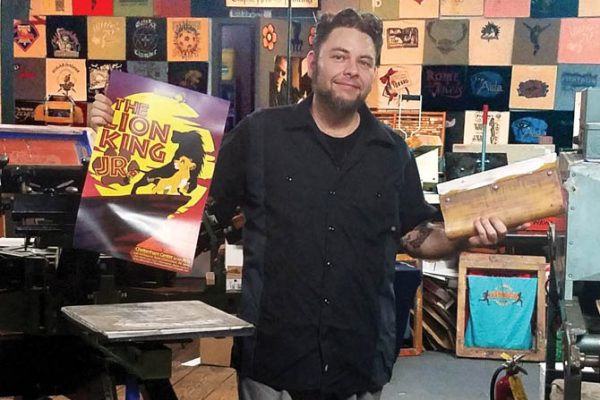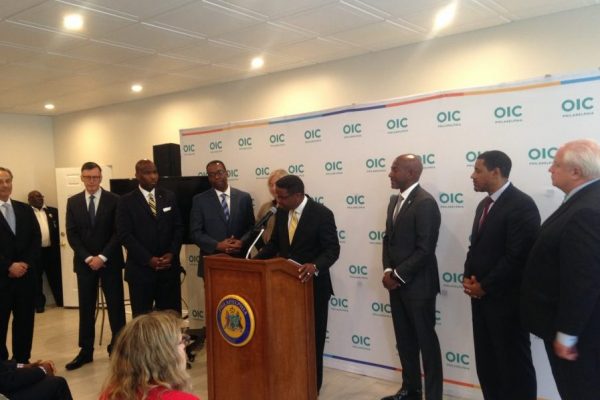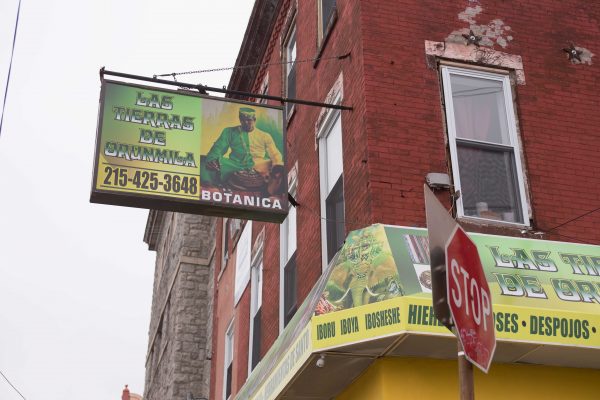Small Biz a Focus at One DNC Meeting, Underserved Philly Communities Could Benefit — Well, Maybe …
During the DNC, Democrats met to discuss becoming the party for small business. Their goal is to form local committees and caucuses across the nation. They’ve already started in Oregon, Washington, California, and Virginia and have a few other areas on deck.
“[Republicans] want to pretend they’re the Party of all business, but they’re really just the party of big business,” said Andrew Lachman, who emceed a Small Business Council meeting at the PA Convention Center. He also serves as chair of the Business and Professions Caucus of the California Democratic Party. “If you’re a Fortune 500 Company, the Republican Party will take care of you very well. But if you are a small business and you’ve got a Walmart moving into your neighborhood, or you need financing, they’re nowhere to be found.”
Other speakers echoed the sentiments of the emcee.
“Did you even hear ‘small business’ mentioned at the RNC?” asked Congresswoman Judy Chu of California, who serves on the House sub-committee for access to capital for small businesses.
Getting the green is the top issue small business owners cite to the Dems as a problem, according to Lachman.
“The number one problem is access to capital,” said one panelist.
But red tape — the excessive bureaucracy or adherence to rules and formalities in public business — was also brought up again and again by attendees. A delegate from Michigan, Stephen Ranzini, who runs a small bank, told a story about a woman who was going to lose her home about ten years ago. She’d made her last mortgage payment, but never requested a “final payment.” A ‘big bank’ started to foreclose. She was eating cat food because she was broke. Ranzini was able to work furiously over 24 hours to secure a loan and stave off the big bank. As he concluded his anecdote the audience cheered. But they fell silent when he dropped a bomb and said that he’d “go to jail” if he helped that woman today.
The rules changed after the financial crisis of 2009. Now he’d have to “wait four days to start the process” and then four more days on the back end before completing any deal. She’d have been eating cat food on the street by then.
Former Cleveland mayor Jane Campbell, who was moderating the panel of experts, asked Ranzini what particular policy he would like to see enacted. He named a few specific to that situation, but his main issue boiled down to too much red tape. He told the crowd about a banking industry inside joke to illustrate the problem.
“We used to say only engineers read the paperwork,”Ranzini explained, using his finger and thumb to show how much there used to be. “Now engineers don’t even read it,” using his whole hand to show how much there is now. “What good [are warnings and disclosures] if no one reads [them]?”
The panelists sympathized, but said the red tape is sometimes a necessary evil to avoid predatory lenders. But Campbell took the middle ground and classified it as, “The law of unintended consequences.”
While federal funding and regulations are important, folks in Philly may have a model to follow in Kansas City. Scott Taylor is a city councilman from K.C. and he helped lead an initiative to help small businesses.
“We listened to them for starters,” Taylor said. “We created a committee dedicated to small businesses.” Taylor chairs that committee.
“It can really be duplicated in any city or town in the United States,” Taylor said, who may or may not be familiar with Philadelphia’s City Council, but given his optimism it’s safe to say “not.” Then again, perhaps our council people can ask the federal people about the programs the next time their offices are visited with a search warrant.
Taylor explained that he heard from small business owners when he first campaigned for office “who’d say, ‘It’s really hard to do business [with Kansas City],’” due to red tape. Apparently representatives in other towns campaign for office rather than just get a couple of Ward leaders in their pocket.
“We really want to make mom and pop businesses succeed … because it’s the backbone of our economy,” he said. “We had 17 hearings all over the city. We got outside city hall [because] small business owners were too busy to drive downtown and find parking. We had over 100 small businesses provide input … We told them to be very blunt. And they were very blunt.” Hey, City Council peeps, Philly folks can be blunt too. And, you can use those remote meeting to justify using a $35,000 city car too!
Taylor said his committee was able to hone the “valuable” input down to “about 60” recommendations. Over the course of one to two years the city was able to implement all 60 of those initiatives. Some ideas were; streamlining the city’s website, creating open-data so entrepreneurs could develop new concepts, and initiating a “buy local” program that connected businesses to each other. An open-data project in Philly now would require a Right-to-Know request and probably result in a delayed reply that reads: “You don’t have a right to know.”
“We have an innovative micro-loan program,” Taylor said. “At the time of these hearings we had just come out of the worst recession ever in the city’s history and the country’s history since the Great Depression … any small loan program for the smallest businesses had disappeared in Kansas City so we had to create our own,” which they did with the help of the Federal Small Business Association (SBA), community partners and a “national micro-lender,” along with the city’s backing. Depending on how many entities are involved and how many councilmanic prerogatives would need to be overcome, the bribe levels here could be keep at a very reasonable rate.
The program allows $500 up to $50,000 loans. “The average loan is about $8000,” Taylor said, from approximately $2.7 million loaned out. “It can be for a home-based business to a storefront business.” In Philly a business owner could use a $500 loan as a down payment on the business privilege tax.
The program has made significant strides with minority-owned businesses, who had pointed out that, “If you were is a certain zip code in town you had trouble getting a traditional bank loan” Taylor said.
Improvements also came for veteran-owned businesses.
“I’ve had veterans come to me and say, ‘I did a tour in Iraq or Afghanistan and I can’t get a bank loan because I have no financial track record,’” Taylor explained. “We’re able to help those people [via a more flexible program].”
Taylor also pointed out that the micro-lender Kansas City uses not only loans money but provides financial counseling to borrowers.
Spirit News reached out the several Philadelphia City Council members for comment but none got back to us in time for the story. We know they are very busy in the summer time. Anyone know a realtor in Kansas City?







